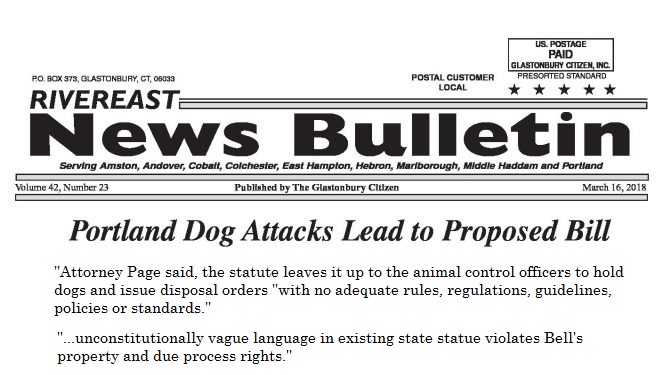Portland CT Politicians Propose To Make It Easier To Kill Dogs

Two women disputing over ownership of dogs
April 16, 2018by Elizabeth Regan
A bill currently before the state legislature originated in Portland after separate dog attacks over the past two years left one man injured and a small dog dead.
State Rep. Christie Carpino, R-32, said she submitted the bill concept because of a con-stituent who reached out to her after a family pet was killed by another dog.
“[I] subsequently found out this issue is much larger and impacts folks across the state,” Carpino said.
The bill would establish a working group to address weaknesses in current dog-related stat-utes that have resulted in complaints from both dog owners and dog attack victims. Many of the complaints revolve around the authority of animal control officers to order a dog to be killed in the aftermath of an attack and the length of time it takes dog owners to appeal the decision through the state.
The bill language said the work group will be charged with developing recommendations
to reduce the number of attacks by domestic animals that “result in the death or serious in-jury of another animal or person.”
In addition to looking at shortening the pro-cess for appealing an animal control officer’s decision to put down a dog, the group would also focus on reducing the financial burden on cities and towns associated with feeding and caring for accused canines that must be housed in municipal pounds while the appeals process drags out.
The language specifies shortening the appeals process be done “while ensuring due process for the animal owners.”
Stephen Demarest, of Portland, was attacked in January 2016 by a dog near his Old Marlborough Turnpike home. His wife, Maria Demarest, spoke at a Board of Selectmen meet-ing late last year to say he received multiple injuries to his legs and groin area before he was able to deliver a “karate kick” to the dog’s head and escape into a neighbor’s car.
A report by Animal Control Officer Karen Perruccio said she ordered the 2-year-old pit bull’s owner, Paul Bell, to bring the dog in to be quarantined after the attack. The dog has been held in the municipal pound since Feb. 1, 2016, at the town’s expense.
According to Connecticut Department of Agriculture legal documents, Perruccio on Feb. 11 authorized the dog to be put down in what is known as a “disposal order.” Bell appealed the decision to the agency’s commissioner,
Steven K. Reviczky Bell is being represented by Thompson G. Page of the Hartford-based Thompson Gould Page firm.
Page said in a Jan. 17 legal filing that “un-constitutionally vague” language in existing state statute violates Bell’s property and due process rights.
The attorney said the statute leaves it up to animal control officers to hold dogs and issue disposal orders “with no adequate rules, regulations, guidelines, policies or standards” for doing so.
More than 25 months after the attack, a final decision has not yet been released by the agri-culture department. Once the commissioner’s decision comes through, it may be appealed through the court system.
Maria Demarest said “something has to change.”
She added that any dog deemed vicious by an animal control officer should be put down – “no questions asked.”
Carpino said there are dozens of dogs across the state who have been awaiting a decision from the agriculture department for extended periods, which she described as unfair to the accused dogs, victims and their owners.
“It’s a local issue that has a statewide impact and that’s why it’s important to me,” she said. In late November, a leashed, 4-pound York shire Terrier was killed in front of a four
family home on Main Street in Portland when an unlicensed Rottweiler broke free from the front porch and attacked.
Dog Attacks cont. from Front Page
Perruccio issued tickets to the Rottweiler’s owner for not having a license and up-to-date rabies vaccine. The dog named was quarantined at his home for two weeks because of the ra-bies threat and is required to be leashed and muzzled for the rest of his life.
The Yorkie’s owners, Bill and Ann Barrows, favor stronger state laws regarding dog-on-dog attacks.
“In the state of Connecticut, [you] can get away with dog-killing-dog and there’s no re-percussions. They don’t even have to be quarantined. And that’s what bothers us,” Ann Bar-rows told the Rivereast shortly after Lizzie’s death.
How a Bill Becomes a Law
The bill, which incorporates several changes based on concerns expressed during a public hearing last week, was approved by the state legislature’s Environment Committee Wednes-day.
“The substitute language is much closer to the intent of the bill,” Carpino said Wednesday afternoon. “It clearly states that we’re trying to protect due process rights for animal owners and balance it with the public safety needs of the individuals involved.”
The substitute bill is titled “An Act Estab-lishing a Working Group to Study Ways to Pre-vent Domestic Dog Attacks.”
The original title, which underscored con-cerns by many animal advocates that the mea-sure was aimed at killing dogs instead of pre-venting attacks, was “An Act Concerning the Disposition of Certain Biting and Attacking Dogs.”
Critics testified at a March 9 public hearing that the mission and suggested makeup of the working group represents biased interests, re-lies on terms that have no definition in state statute, and is duplicative of an existing work group.
Lee Greenwood, a legislative attorney with the national Best Friends Animal Sanctuary, said during the public hearing that calling out the “Certain Biting and Attacking Dogs” in the original title exemplified the bill’s bias and its fundamental misunderstandings about dogs. “If we are going to promote public safety, the exact wrong place to begin is with the mindset that there are certain types of dogs that are inherently more prone to attack or bite,” Greenwood said. “The name of the bill displays the misunderstanding of dog behavior and per-fectly captures why any future legislatively-formed working group must include a more di-verse group of stakeholders.”
The original bill stated the working group must consist of the Department of Agriculture commissioner or his designee, the state veterinarian, a member of the American Kennel Club, and representatives from the following groups: animal control officers, dog bite victims, mu-nicipal leadership, the insurance industry, the office of the Attorney General, municipal police, and state police.
Numerous animal advocates testified the list lacks representation from animal focused groups such as local or national animal welfare organizations, animal shelters, veterinary groups and animal behaviorists. Victims’ ad-vocates said the working group should include medical professionals like emergency room doctors or re-constructive surgeons.
The substitute bill language removed the American Kennel Club from the list of repre-sentatives, instead adding one representative selected by the Connecticut Humane Society and one selected by the American Society for the Prevention of Cruelty to Animals. The sub-stitute bill also includes a trauma physician, a fire department or ambulance representative, and one additional municipal leader.
Another key concern at the hearing was voiced by American Society for the Prevention of Cruelty of Animals Senior State Legislative Director Debora M. Bresch.
“While we can applaud the notion of intro-ducing efficiencies into this seemingly broken system, the objective should not be to further roll back owner rights or kill dogs sooner but rather to enact a constitutional law that deliv-ers long-needed due process to dog owners, protects dogs from needless suffering, and fo-cuses public resources on dogs who truly pose a threat to their communities,” Bresch testified.
Bell’s attorney Thompson Page, who represents other clients whose dogs have been im-pounded after biting people, was among those who submitted testimony at the public hearing. He said the existing statute as well as the bill lack definitions for fundamental terms like “vicious” and “attack.”
“There also needs to be a defined and devel-oped process to fairly determine the circum-stances surrounding an alleged bite incident which qualify the incident as an attack,” Page said. “The working group cannot examine ‘vi-cious dog attacks’ if they have no common di-rection and definition for understanding these terms.”
Commissioner Reviczky, who submitted tes-timony in support of the bill, said the agency submitted several recommendations to the leg-islature, including updating existing language and making it more specific. Examples include providing more direction for animal control officers when it comes to deciding if a dog should be restrained or killed; adding a new subsection to the statute to provide a “timelier process for resolving disputes”; and empower-ing cities and towns to engage in mediation before an appeal goes to the agriculture depart-ment.
Portland First Selectwoman Susan Bransfield said this week she supports the bill as a way to address the “terrible anguish” that can result when a dog maims or kills a person or another pet.
She said she can’t thank Carpino enough for taking the lead on the issue.
“The responsibility of those who own dogs is great. We need to be vigilant that our owners are caring for animals properly,” she said.
“The time is right for us to look at the humane treat-ment of animals and the humane treatment of humans as well.”



